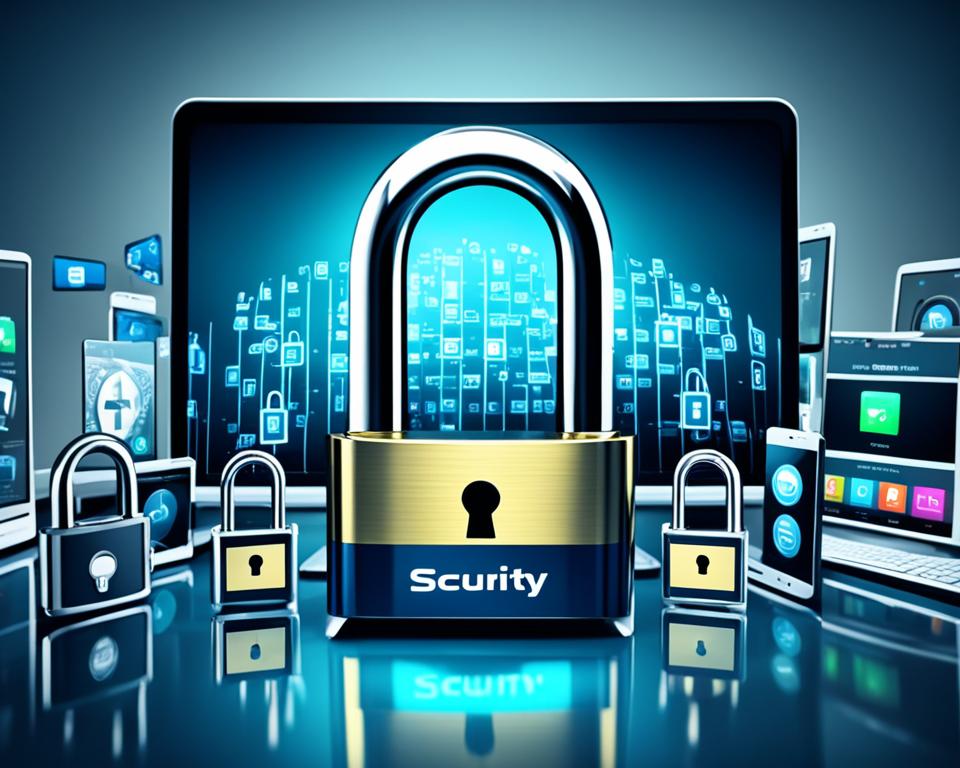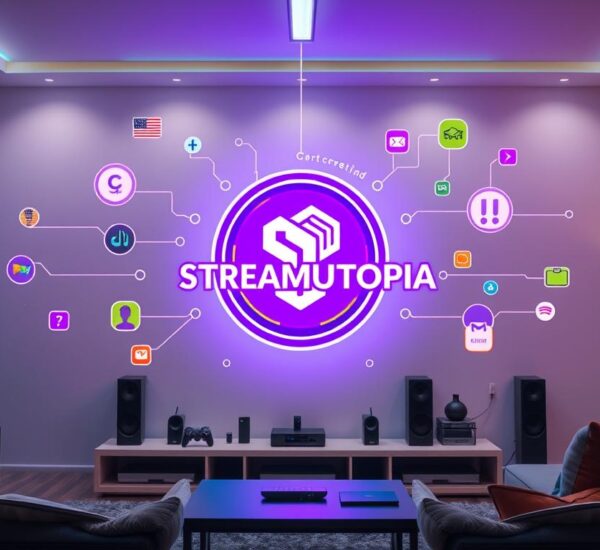In the digital age, safeguarding privacy is paramount, especially when indulging in Internet Protocol Television (IPTV). While IPTV offers convenience and access to a plethora of entertainment options, it also raises concerns about data privacy and security. Before exploring protective measures, it’s crucial to understand the privacy risks associated with IPTV usage.
IPTV services may collect and store user data, including browsing history, viewing preferences, and device information. This data can be exploited by service providers or third parties for targeted advertising or other purposes.
Key Takeaways:
- IPTV services collect and store user data, raising concerns about data privacy.
- Privacy risks in IPTV include targeted advertising and potential data exploitation.
- Safeguarding content and data privacy is essential in the world of IPTV.
- Protective measures, such as encryption technology and secure network connections, can enhance IPTV security.
- User education and choosing secure IPTV providers are essential for maintaining privacy in the IPTV ecosystem.
The Importance of IPTV Security
IPTV security is essential in ensuring the protection of both the content being broadcasted and the privacy of users. By implementing effective security measures, IPTV service providers can prevent unauthorized access to content, deter piracy, and mitigate potential cybersecurity threats. These security measures are vital for maintaining the integrity and confidentiality of IPTV services.
One of the primary reasons why IPTV security is crucial is to ensure secure streaming. By implementing secure streaming protocols and encryption techniques, service providers can safeguard the transmission of content over IP networks. This prevents unauthorized interception and ensures that the content is only accessible to authorized viewers.
Another aspect of IPTV security is piracy prevention. With the rise of digital piracy, it is essential for service providers to implement robust measures to prevent unauthorized distribution and illegal access to copyrighted content. By utilizing advanced encryption algorithms, watermarking, and digital rights management (DRM) systems, content piracy can be mitigated, protecting the revenue and rights of content creators.
Besides content protection, IPTV security also focuses on preventing cybersecurity threats. IPTV services can be vulnerable to various cyberattacks, including hacking, malware injection, and data breaches. Effective security measures, such as regular software updates, intrusion detection systems, and firewalls, help in preventing these threats and safeguarding user data.
Overall, IPTV security is critical for maintaining the trust and confidence of both content creators and viewers alike. By ensuring secure streaming, preventing piracy, and mitigating cybersecurity threats, IPTV service providers can create a safe and secure environment for users to enjoy their favorite content without compromising their privacy and data security.
Strategies for IPTV Security
Ensuring robust security measures is crucial for safeguarding IPTV content and protecting against unauthorized access and piracy. Implementing encryption technology and anti-piracy measures are key strategies to enhance IPTV security.
Encryption Technology
Encryption technology plays a vital role in protecting the content transmitted over the IP network. By encrypting the data, advanced algorithms make it difficult for unauthorized parties to intercept or access the content. This ensures the integrity and confidentiality of the transmitted data, providing a secure IPTV experience.
Anti-Piracy Measures
To combat content piracy and illegal distribution, implementing effective anti-piracy measures is essential. Two widely adopted measures are watermarking and digital rights management (DRM) systems.
- Watermarking: Watermarking involves embedding unique identifiers in the content, making it traceable in case of unauthorized distribution. This discourages content pirates by increasing the chances of detection and protecting the interests of content creators.
- Digital Rights Management (DRM) Systems: DRM systems provide comprehensive control over digital content by managing access and usage rights. These systems ensure that content is accessed only by authorized viewers, preventing unauthorized distribution.
By implementing encryption technology and anti-piracy measures, IPTV providers can significantly enhance the security of their services and protect content from unauthorized access and piracy.
| Strategies for IPTV Security | Benefits |
|---|---|
| Encryption Technology |
|
| Watermarking |
|
| Digital Rights Management (DRM) Systems |
|
Protecting Data Privacy in IPTV
Data privaсу is a significant concern in IPTV services. To safeguard the privaсу of user data, it is imperative to opt for IPTV providers that prioritize transparent privaсу policies and adhere to strict data protection standards. By reviewing and understanding the privaсу policies of the IPTV service, users can make informed decisions and be aware of the data that may be collected and its potential use.
The Importance of Transparent Privacy Policies
When it comes to IPTV, transparent privaсу policies are vital in protecting user data. These policies outline how the IPTV service collects, uses, and protects user information. By choosing IPTV providers with transparent policies, users can ensure that their data is treated with the utmost care and that their privacy is respected.
Transparent privaсу policies should include:
- Clear explanations of the types of data collected
- Purposes for which the data is collected
- How the data is stored and protected
- Procedures for handling data breaches or security incidents
- How the user can access, modify, or delete their data
Evaluating Privacy Policies
Before subscribing to an IPTV service, it is essential to evaluate and understand the privaсу policies in place. Users should carefully consider the following:
- Data Collection: Pay attention to the types of user data that the IPTV service collects. This may include personal information, viewing habits, or device data.
- Data Usage: Understand how the collected data will be used. Will it be used for targeted advertising, service improvement, or other purposes?
- Data Sharing: Ascertain whether the IPTV service shares user data with third parties and for what purposes.
- Data Protection: Assess the measures the IPTV service takes to safeguard user data. This may include encryption, secure storage, and regular security audits.
- Data Retention: Review how long the IPTV service retains user data. It is essential to know the data retention period and how data will be disposed of once it is no longer needed.
By effectively understanding and evaluating privaсу policies, users can make informed decisions about the IPTV service that best aligns with their privaсу preferences and requirements. Additionally, being aware of these policies empowers users to protect their data and take necessary steps to maintain their privaсу.
| Benefits of Transparent Privacy Policies in IPTV |
|---|
| 1. Builds trust and loyalty among users. |
| 2. Gives users control over their own data. |
| 3. Enhances the overall user experience. |
| 4. Provides peace of mind regarding data security and usage. |

Implementing Secure Network Connections
To enhance IPTV security, it is crucial to establish secure network connections. One effective way to achieve this is by utilizing Virtual Private Networks (VPNs). By using a VPN, users can encrypt their internet connections, ensuring that their online activities are protected from prying eyes and potential threats.
A reputable VPN service with a strict no-logs policy should be selected to ensure maximum privacy protection. A no-logs policy means that the VPN provider does not track or store any user activity logs, further enhancing the security and privacy of IPTV usage.
A VPN creates a secure tunnel between the user’s device and the IPTV service, preventing unauthorized access and interception of sensitive data. This not only safeguards the content being streamed but also protects the user’s personal information from potential cybersecurity threats.
By encrypting network connections with a VPN, users can enjoy IPTV services with peace of mind, knowing that their online activities are shielded from malicious actors. VPNs provide an additional layer of security, ensuring that only authorized viewers have access to the content and that their data remains private.
Table: Comparison of Secure Network Connections Options
| Secure Network Connections Options | Key Features |
|---|---|
| Virtual Private Network (VPN) |
|
| Standard Internet Connection |
|
Implementing secure network connections through the use of VPNs is a crucial step in safeguarding IPTV security. By encrypting internet connections and ensuring data privacy, users can enjoy the benefits of IPTV while minimizing the risk of privacy breaches and unauthorized access.
Regular Software Updates for IPTV Security
Regular software updates play a crucial role in ensuring the security of your IPTV system. By promptly installing the latest security patches and updates, you can protect against potential security threats and vulnerabilities. These updates are essential for safeguarding user privacy and preventing unauthorized access to your IPTV content.
Software updates provide important fixes for known security issues and vulnerabilities. They address weaknesses that can be exploited by malicious actors to gain unauthorized access to your system or compromise user data. By keeping your IPTV software, applications, and devices up to date, you can effectively patch these vulnerabilities and maintain a secure environment for content delivery.
One of the key benefits of regular software updates is the continuous improvement of the security features in your IPTV system. Developers constantly work to identify and address new security risks, and by installing updates, you ensure that your system remains equipped with the latest protection mechanisms.
In addition to security enhancements, software updates also bring new features and improvements to the overall functionality of your IPTV system. These updates can enhance the user experience, provide better performance, and introduce new capabilities that further optimize your IPTV content delivery.
The Importance of Security Patches
Security patches are specific updates designed to fix vulnerabilities and address security weaknesses in your IPTV software, applications, and devices. They are created in response to emerging threats, known security issues, or vulnerabilities discovered through proactive security assessments.
Installing security patches promptly is crucial to ensure the ongoing security of your IPTV system. Ignoring or delaying these updates leaves your system vulnerable to exploitation, as attackers often target known vulnerabilities. By keeping your system up to date with the latest security patches, you significantly reduce the risk of potential attacks and data breaches.
It is important to note that security patches not only protect your IPTV system but also contribute to the security of your viewers. By ensuring the integrity of your content delivery infrastructure, you safeguard your viewers’ personal information, protect against unauthorized access to their data, and maintain their trust in your IPTV service.
Regular software updates and security patches are essential for the ongoing security and privacy of your IPTV system. By promptly installing updates, you can mitigate security risks, protect against unauthorized access, and ensure the safe delivery of content to your viewers. Make it a priority to stay informed about the latest updates and patches provided by your IPTV software and device manufacturers, and implement a regular update schedule to maintain a secure IPTV environment.
Being Cautious of Free IPTV Services
While free IPTV services may seem tempting, users should exercise caution due to the privacy risks associated with these platforms. It’s important to understand that free IPTV services often rely heavily on advertising revenue, which is generated by collecting and selling user data. This puts user privacy at risk and exposes personal information to potential misuse.
When using free IPTV services, users should be aware that their data is being collected and potentially shared with third parties. This data could include browsing habits, viewing preferences, and even personal information. Such information can be used for targeted advertising or other purposes, compromising privacy in the process.
To protect privacy and minimize the risks associated with free IPTV services, it’s advisable to take a cautious approach. Consider the following steps:
- Read the privacy policies of free IPTV services to understand how your data will be collected, used, and shared.
- Avoid providing unnecessary personal information when signing up for free IPTV services.
- Use strong, unique passwords for each service to prevent unauthorized access to your account.
- Regularly review and update privacy settings on your IPTV devices and applications.
By being aware of the privacy risks and taking necessary precautions, users can navigate the world of free IPTV services with greater peace of mind. However, it’s important to note that opting for reputable, paid IPTV services may provide a more secure and privacy-focused experience.
Balancing Content Accessibility and Security
When it comes to IPTV security, striking the right balance between content accessibility and security is crucial. Service providers must ensure that their security measures do not hinder the user experience while still safeguarding against potential risks.
Content accessibility refers to the ease with which authorized viewers can access IPTV content. On the other hand, security measures aim to protect the content and ensure that only authorized users have access to it.
To achieve this equilibrium, service providers can implement a range of security measures that do not compromise the overall user experience. Let’s take a look at some of these measures:
- Implementing strong user authentication processes to verify the identity of authorized users.
- Using encryption technology to protect the transmission of content over the IP network.
- Employing robust access control mechanisms to prevent unauthorized access.
- Regularly updating and patching software and systems to address potential vulnerabilities.
By adopting these security measures, service providers can ensure the protection of content while still maintaining a seamless user experience. The goal is to strike a balance that allows authorized viewers to access the content easily while upholding the highest standards of security.
Take a look at the table below for a visual representation of the key considerations when balancing content accessibility and security:
| Content Accessibility | Security Measures |
|---|---|
| Seamless user experience | Strong user authentication |
| Ease of access for authorized users | Encryption technology |
| Effortless content consumption | Robust access control |
This table provides a clear overview of the considerations involved in balancing content accessibility and security. It emphasizes the importance of finding the right equilibrium to ensure that users can enjoy the content while protecting against security breaches.
By implementing appropriate security measures, such as those highlighted in the table, service providers can create an environment where authorized viewers can access content effortlessly and securely.
The Role of Secure IPTV Providers
When it comes to safeguarding data protection and privacy in the world of IPTV, opting for secure IPTV providers is of utmost importance. By choosing providers that prioritize user privacy, offer transparent privacy policies, and have robust security measures in place, users can ensure their personal information remains safe and secure.
Secure IPTV providers understand the significance of data protection and implement stringent measures to safeguard user privacy. They employ advanced encryption technologies to protect content transmission and prevent unauthorized access. These providers also have comprehensive privacy policies that clearly outline the data they collect, how it is stored, and how it is used, ensuring transparency and compliance with data protection regulations.
Moreover, secure IPTV providers have robust security measures in place to mitigate potential cybersecurity threats. They invest in state-of-the-art infrastructure and employ security experts to monitor and respond to any security incidents promptly. By proactively addressing security vulnerabilities, these providers prioritize the safety and privacy of their users.
Benefits of Choosing Secure IPTV Providers:
- Enhanced data protection
- Transparent privacy policies
- Advanced encryption technologies
- Mitigation of cybersecurity threats
- Prompt incident response
By selecting secure IPTV providers, users can enjoy their favorite content while having peace of mind regarding the security and privacy of their personal data.
In the next section, we will explore the need for user education in IPTV security and highlight the best practices that can further strengthen data protection and privacy.
The Need for User Education in IPTV Security
When it comes to IPTV security, user education plays a vital role in safeguarding personal information and ensuring a secure streaming experience. By being aware of best practices and taking necessary precautions, users can actively contribute to their own security and privacy in the IPTV ecosystem.
Choose Strong Passwords
One of the first and most important steps in securing IPTV accounts is choosing strong, unique passwords. Users should create passwords that include a combination of uppercase and lowercase letters, numbers, and special characters. Avoid using easily guessable information, such as birthdays or names, and consider using a reputable password manager to securely store and generate unique passwords.
Avoid Phishing Emails
Phishing emails are a common method used by cybercriminals to gain unauthorized access to personal accounts. Users should exercise caution when receiving emails requesting personal information or urging immediate action. Avoid clicking on suspicious links or downloading attachments from unknown sources. Instead, verify the authenticity of the email by contacting the IPTV provider directly or visiting their official website.
Report Suspicious Activities
If users notice any suspicious activities on their IPTV accounts, such as unauthorized access or unusual billing, it is important to report them immediately to the IPTV provider. Prompt action can help protect not only the individual’s account but also the broader IPTV community from potential security breaches.

Stay Informed
Keeping up to date with the latest developments in IPTV security is crucial for users. Following reputable security blogs and news sources can provide valuable insights, tips, and updates on emerging threats and best practices. By staying informed, users can adapt their security measures to address new challenges and vulnerabilities.
Enable Two-Factor Authentication
Two-factor authentication (2FA) adds an extra layer of security to IPTV accounts. By requiring a second form of verification, such as a unique code sent to a trusted device, 2FA helps prevent unauthorized access even if a password is compromised. Users should enable and utilize 2FA whenever possible to enhance the security of their IPTV accounts.
By prioritizing user education and implementing best practices, individuals can navigate the IPTV landscape with confidence, knowing they have taken steps to protect their security and privacy.
Monitoring and Managing IPTV Security
Effective monitoring and management of IPTV security is crucial to ensure the safety and protection of both the content and the users’ data. By utilizing the right tools and techniques, IPTV service providers can collect, analyze, and act on security data in a proactive manner. Let’s explore some essential strategies for monitoring and managing IPTV security:
Security Information and Event Management (SIEM) Systems
Implementing Security Information and Event Management (SIEM) systems is a key step in monitoring and managing IPTV security. These systems provide real-time alerts, correlation of security events, and visualization of the security status. By centralizing security logs and event data, SIEM systems enable service providers to swiftly detect and respond to potential threats, ensuring the integrity of the IPTV infrastructure.
Regular Security Audits and Testing
Conducting regular security audits and testing is essential to identify vulnerabilities and address potential security loopholes in the IPTV system. By performing comprehensive security assessments, service providers can proactively identify weaknesses and implement appropriate security measures to mitigate risks. This helps ensure that the IPTV platform remains resilient against evolving security threats.
Incident Response Protocols
Establishing robust incident response protocols is crucial for effective management of security incidents in IPTV systems. Service providers should have well-defined processes and procedures in place to handle incidents such as data breaches, unauthorized access attempts, or other security breaches. These protocols enable quick and effective response, minimizing the impact of security incidents and ensuring the continuity of services.
Importance of Monitoring and Managing IPTV Security
| Benefits | Best Practices |
|---|---|
| Early detection of security threats | Implement SIEM systems |
| Proactive mitigation of vulnerabilities | Conduct regular security audits and testing |
| Effective incident response | Establish incident response protocols |
| Protection of content and user data | Monitor network traffic for abnormalities |
| Maintaining the integrity of the IPTV system | Stay updated with security patches and updates |
By incorporating these monitoring and management practices into their IPTV security strategy, service providers can fortify their systems against emerging threats, protect the privacy of users’ data, and ensure a secure and trustworthy IPTV experience.
Conclusion
Ensuring IPTV security and safeguarding content and data privacy are paramount in the digital landscape. By adhering to best practices, selecting secure IPTV providers, and maintaining vigilance regarding data privacy, both content creators and viewers can enjoy IPTV services with confidence. Prioritizing robust security measures guarantees the safe and secure delivery of content, while protecting user privacy in the fast-evolving digital realm.
By incorporating encryption technology, anti-piracy measures, and implementing secure network connections, IPTV service providers can effectively safeguard content and user data from unauthorized access and distribution. Regular software updates and selecting trusted IPTV providers also play a crucial role in maintaining security and protecting against potential vulnerabilities.
Additionally, users must be aware of the privacy risks associated with free IPTV services and be cautious when sharing personal information. Educating users about best practices, such as creating strong passwords, identifying phishing attempts, and reporting suspicious activities, is key to maintaining individual security within the IPTV ecosystem.
Overall, prioritizing IPTV security measures, partnered with user education, will contribute to maintaining the confidentiality, integrity, and availability of content, as well as safeguarding data privacy in the ever-expanding world of IPTV.
FAQ
What are the privacy risks associated with IPTV usage?
How can IPTV security be enhanced?
How can data privacy be protected in IPTV services?
How can secure network connections be established in IPTV?
Why are regular software updates important for IPTV security?
What should users be cautious of when using free IPTV services?
How can content accessibility and security be balanced in IPTV?
Why is it important to choose secure IPTV providers?
What role does user education play in IPTV security?
How can IPTV security be monitored and managed?





